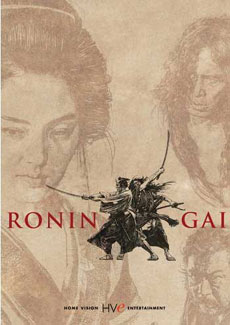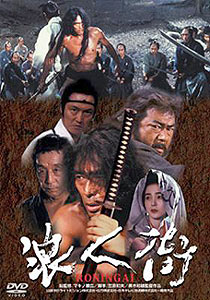 The epic 1990 remake of Roningai (Ronin Street) is an all-round superior samurai film, a true throwback to the classic age of Japanese cinema, inclusive of intentional references to Akira Kurosawa. The epic 1990 remake of Roningai (Ronin Street) is an all-round superior samurai film, a true throwback to the classic age of Japanese cinema, inclusive of intentional references to Akira Kurosawa.
It was Shintaro Katsu's last film, & what a beautiful farewell it was to be for his sizeable international fandom, who knew him best for his performances in the Zatoichi films.
Katsu plays a rumbling, grumbling giant of a masterless samurai, Akaushi "Bull" Goemon, who hangs out in a prostitues' bar at the very end of the Street of Masterless Samurai, where he serves as defacto bouncer, drinking & whoring.
He makes a few small coins now & then by letting people pay him to bash him on the skull. When a girl warns him he'll go crazy if he keeps letting people club him on the head, he replies gleefully, "I can't get crazier than I am!"
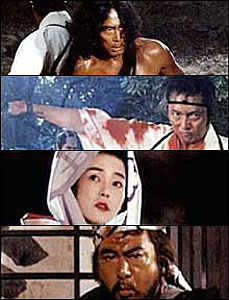 Bull, though a worn out echo of the great man he seems once to have been, has never given up his dream of someday being restored as a retainer to some clan, in no matter how small a position. Bull, though a worn out echo of the great man he seems once to have been, has never given up his dream of someday being restored as a retainer to some clan, in no matter how small a position.
He's so willing to accept anything at all that when he finally does get the offer of a miniscule 50 koku allowance to serve a castle retainer, he promises to do his best even though it is made perfectly clear that his main job will be to bark & fetch & act like a dog.
In his own mind, we have to suppose, having a bad lord who seeks only to humiliate him is no hindrance to his spirit, as duty is what matters, & obedience is what defines him. Retainers of good lords never have such a chance to prove their excellence at adhering to their duty to serve.
Still, we the viewers, like all his friends on the Street of Masterless Samurai, can hardly believe Bull is willing to serve & protect a man who is in fact the leader of a group of corrupt castle retainers who delight in capturing, torturing, & killing prostitutes.
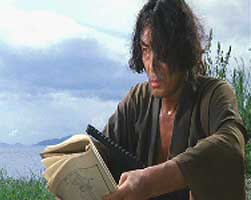 Another of this layered story's masterless samurai is Aramaki Gennai, an arch alcoholic lady's man played by Yoshio Harada, who old-time chambara fans will remember as Jokichi from the extraordinarily grand Trail of Blood trilogy (1972). Another of this layered story's masterless samurai is Aramaki Gennai, an arch alcoholic lady's man played by Yoshio Harada, who old-time chambara fans will remember as Jokichi from the extraordinarily grand Trail of Blood trilogy (1972).
Harada is aging beautifully & surprisingly still buff, with the physical grace & charisma he possessed in Trail of Blood. Gennai spends most of his time sleeping, getting laid & relying on women for pocket change, avoiding committing himself to anything worthwhile, & drinking himself blotto.
His primary relationship is with a fallen samurai daughter whose hardships have led her to prostitution. Oshin (Kanako Higuchi) is a woman of large spirit but with very poor taste of who to love with devotion. Not until the final reel of the film, when three masterless samurai arrive to confront the harlot-killers, will Aramaki Gennai prove himself a romantic hero instead of a lazy drunken cowardly pimp.
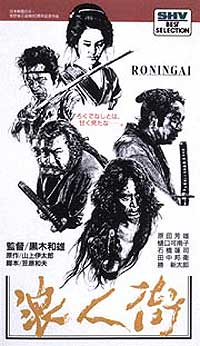 Fans of classic yakuza-eiga (ganster films) will recognize Kunie Tanaka for his veritable specialty in playing the comic relief friend of the hero, a chivalrous yakuza usually played by Ken Takakura; but he also very often turned in moving, serious performances, as he does in Roningai. Fans of classic yakuza-eiga (ganster films) will recognize Kunie Tanaka for his veritable specialty in playing the comic relief friend of the hero, a chivalrous yakuza usually played by Ken Takakura; but he also very often turned in moving, serious performances, as he does in Roningai.
He has long been one of the finest supporting actors of all time, &a it is wonderful to see him in what amounts to a leading man performance, since for of the ronin in the story pretty much share screen time equally.
Kunie plays the depressed ronin Doi Magohachiro who makes a very bad living selling birds & always smells of birdshit. His only remaining possessions from his former life are his swords, a spear, & suit of armor he has long refused to pawn, as to part with it would be an admission that he is after all a birdseller for life.
The only thing that keeps him going is his dream of restoration as a clan retainer. Yet when the opportunity arises, it will require a bribe of a hundred ryo, & for him it might as well be a thousand.
By the time he does manage to get the money (by murder & theft) his sister demands he become a real samurai instead moping around for a retainership, chastising him to join the other ronin in the final copnfrontation with castle retainers.
Though his dream is in his grasp he nevertheless replies to his sister, "You won't regret it?" She says she will never regret it, & for the first time Magohachiro's deep depression lifts from his shoulder, & he heads off to don armor, borrow a horse, & ride off to finally assist the people of this place that has become his home.
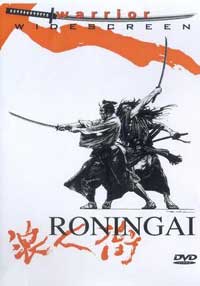 The fourth of the four key ronin of the tale is played by Renji Ishibashi. He's the gloomy ronin Tanomo Gonbei aka "Horo," who has more pocket change than any of the ronin because he hires himself out to those repulsive self-important & murderous castle samurai as a "sword tester," meaning he tests swords by cutting corpses in half.
The fourth of the four key ronin of the tale is played by Renji Ishibashi. He's the gloomy ronin Tanomo Gonbei aka "Horo," who has more pocket change than any of the ronin because he hires himself out to those repulsive self-important & murderous castle samurai as a "sword tester," meaning he tests swords by cutting corpses in half.
The Shinto horror of touching corpses gave rise to the Eta class of outcastes of Korean descent, who worked primarily in slaughterhouses & as leatherworkers. Certainly no samurai with any remaining pride would use a sword on a dead body, but Horo is just that desparate.
The castle retainers aren't satisfied merely to humiliate him & see his obvious skill so misused, but humiliate him further, insisting in one scene that he hack up the woman's corpse multiple times or go unpaid. His horror of his own downfall is evident in every one of his scenes, yet he maintains a calm demeanor & watches the impoverished denizens of Samurai Street with tragic affection.
Horo is deeply in love with Oshin. She may realize he'd be a more suitable lover who would protect her from having to resort to prostitution, but she cannot help herself, she loves only Aramaki Gennai. Horo's anguish is the most selfless sorrow of this whole group of ronin. When Oshin is captured by the castle retainers, he immediately clads himself in a clean white garment intent on dying in the final assault to save the woman who does not love him.
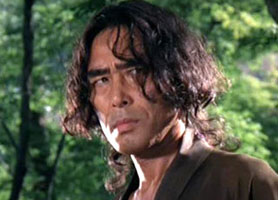 These four ronin are the heart of the film, around which a complex historic tapestry is woven at the end of the Tokugawa era, as feudalism was dying. Though often grim & tragic, there is also humor & beauty.
These four ronin are the heart of the film, around which a complex historic tapestry is woven at the end of the Tokugawa era, as feudalism was dying. Though often grim & tragic, there is also humor & beauty.
There's a wonderful sequence when Katsu's character Bull encounters a man selling "Osaka Noodles" on the street. The noodleman turns out to be an ex-samurai who makes his noodles with the same intention of greatness that he once expressed in swordsmanship.
When Bull tastes this man's noodles, he is brought to tears by the perfection of "true Osaka" noodles. The noodleman is so moved he refuses to be paid, because "Your tears are payment enough." This sentimental sequence never becomes mawkish; it is truly touching. The scene is dragged out to the maximum but is never for a moment anything but riveting, because the film evokes a real caring about its characters.
The story is headed toward that final encounter to save Oshin from the seven castle retainers & around 80 of their minions. Three of the ronin arrive in her behalf, but Bull played by Katsu is the devoted retainer of one of the worst guys ever, & stands among the other minions drinking sake & singing a folksong to himself, & appears almost to be going mad.
His best friend, Horo, had once asked Bull "Don't let them kill more harlots." But Bull is trapped by his own sense of duty. He accepted his trivial retainership & is stuck with it. How he resolves his dilemma is so poetically horrific that I was in tears that such a wonderful actor as Shintaro Katsu could leave his devotted fans with this superb farewell.
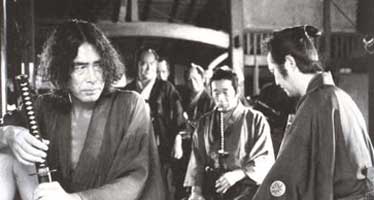 Director Kazio Kuroki is the son of Masahiro Makino who did the epic silent film version & two remakes, & who assisted in this final remake a couple of years before his death. Director Kazio Kuroki is the son of Masahiro Makino who did the epic silent film version & two remakes, & who assisted in this final remake a couple of years before his death.
Kazio Kuroki remade his father's most famous film in commemoration of the 60th Anniversary of the death of his grandfather, film pioneer Shozo Makino.
The beautiful soundtrack is by Ryuichi Sakamoto formerly of Yellow Magic Orchestra. Ryuichi is a household name in Japan, & westerners may remember him as the young commandant in Merry Christmas Mr. Lawrence (1983) for which he wrote the score.
He also wrote the score as well for Bernardo Bertolucci's The Last Emperor (1987). The beauty of the Roningai soundtrack is enhanced by the classic performance on biwa by Eisei Amamoto who appears in the film periodically as the elderly biwahoshi player, & whose plucking is poignant through most of the film, until it becomes maniacal strumming by the time of the final extended battle.
copyright © by Paghat the Ratgirl
|
